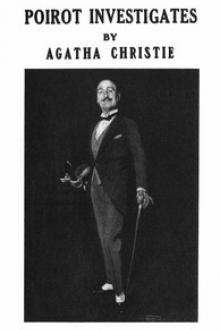Poirot Investigates - Agatha Christie (popular novels .txt) 📗

- Author: Agatha Christie
- Performer: -
Book online «Poirot Investigates - Agatha Christie (popular novels .txt) 📗». Author Agatha Christie
“We thanked him, and said that we quite understood it would probably be no good, but that we should like an order all the same—just in case. And we went there straight away in a taxi, for, after all, you never know. No. 4 was on the second floor, and just as we were waiting for the lift, Elsie Ferguson—she’s a friend of mine, Captain Hastings, and they are looking for a flat too—came hurrying down the stairs. ‘Ahead of you for once, my dear,’ she said. ‘But it’s no good. It’s already let.’ That seemed to finish it, but—well, as John said, the place was very cheap, we could afford to give more, and perhaps if we offered a premium.——A horrid thing to do, of course, and I feel quite ashamed of telling you, but you know what flat-hunting is.”
I assured her that I was well aware that in the struggle for house-room the baser side of human nature frequently triumphed over the higher, and that the well-known rule of dog eat dog always applied.
“So we went up and, would you believe it, the flat wasn’t let at all. We were shown over it by the maid, and then we saw the mistress, and the thing was settled then and there. Immediate possession and fifty pounds for the furniture. We signed the agreement next day, and we are to move in to-morrow!” Mrs. Robinson paused triumphantly.
“And what about Mrs. Ferguson?” asked Parker. “Let’s have your deductions, Hastings.”
“‘Obvious, my dear Watson,’” I quoted lightly. “She went to the wrong flat.”
“Oh, Captain Hastings, how clever of you!” cried Mrs. Robinson admiringly.
I rather wished Poirot had been there. Sometimes I have the feeling that he rather underestimates my capabilities.
The whole thing was rather amusing, and I propounded the thing as a mock problem to Poirot on the following morning. He seemed interested, and questioned me rather narrowly as to the rents of flats in various localities.
“A curious story,” he said thoughtfully. “Excuse me, Hastings, I must take a short stroll.”
When he returned, about an hour later, his eyes were gleaming with a peculiar excitement. He laid his stick on the table, and brushed the nap of his hat with his usual tender care before he spoke.
“It is as well, mon ami, that we have no affairs of moment on hand. We can devote ourselves wholly to the present investigation.”
“What investigation are you talking about?”
“The remarkable cheapness of your friend’s, Mrs. Robinson’s, new flat.”
“Poirot, you are not serious!”
“I am most serious. Figure to yourself, my friend, that the real rent of those flats is £350. I have just ascertained that from the landlord’s agents. And yet this particular flat is being sublet at eighty pounds! Why?”
“There must be something wrong with it. Perhaps it is haunted, as Mrs. Robinson suggested.”
Poirot shook his head in a dissatisfied manner.
“Then again how curious it is that her friend tells her the flat is let, and, when she goes up, behold, it is not so at all!”
“But surely you agree with me that the other woman must have gone to the wrong flat. That is the only possible solution.”
“You may or may not be right on that point, Hastings. The fact still remains that numerous other applicants were, sent to see it, and yet, in spite of its remarkable cheapness, it was still in the market when Mrs. Robinson arrived.”
“That shows that there must be something wrong about it.”
“Mrs. Robinson did not seem to notice anything amiss. Very curious, is it not? Did she impress you as being a truthful woman, Hastings?”
“She was a delightful creature!”
“Évidemment! since she renders you incapable of replying to my question. Describe her to me, then.”
“Well, she’s tall and fair; her hair’s really a beautiful shade of auburn——”
“Always you have had a penchant for auburn hair!” murmured Poirot. “But continue.”
“Blue eyes and a very nice complexion and—well, that’s all, I think,” I concluded lamely.
“And her husband?”
“Oh, he’s quite a nice fellow—nothing startling.”
“Dark or fair?”
“I don’t know—betwixt and between, and just an ordinary sort of face.”
Poirot nodded.
“Yes, there are hundreds of these average men—and, anyway, you bring more sympathy and appreciation to your description of women. Do you know anything about these people? Does Parker know them well.”
“They are just recent acquaintances, I believe. But surely, Poirot, you don’t think for an instant——”
Poirot raised his hand.
“Tout doucement, mon ami. Have I said that I think anything? All I say is—it is a curious story. And there is nothing to throw light upon it; except perhaps the lady’s name, eh, Hastings?”
“Her name is Stella,” I said stiffly, “but I don’t see——”
Poirot interrupted me with a tremendous chuckle. Something seemed to be amusing him vastly.
“And Stella means a star, does it not? Famous!”
“What on earth——”
“And stars give light! Voilà! Calm yourself, Hastings. Do not put on that air of injured dignity. Come, we will go to Montagu Mansions and make a few inquiries.”
I accompanied him, nothing loath. The Mansions were a handsome block of buildings in excellent repair. A uniformed porter was sunning himself on the threshold, and it was to him that Poirot addressed himself:
“Pardon, but could you tell me if a Mr. and Mrs. Robinson reside here?”
The porter was a man of few words and apparently of a sour or suspicious disposition. He hardly looked at us and grunted out:
“No. 4. Second floor.”
“I thank you. Can you tell me how long they have been here?”
“Six months.”
I started forward in amazement, conscious as I did so of Poirot’s malicious grin.
“Impossible,” I cried. “You must be making a mistake.”
“Six months.”
“Are you sure? The lady I mean is tall and fair with reddish gold hair and——”
“That’s ’er,” said the porter. “Come in the Michaelmas quarter, they did. Just six months ago.”
He appeared to lose interest in us and retreated slowly up the hall. I followed Poirot outside.
“Eh bien, Hastings?” my friend demanded slyly. “Are you so sure now that delightful women always speak the truth?”
I did not reply.
Poirot had steered his way into Brompton Road before I asked him what he was going to do and where we were going.
“To the house agents, Hastings. I have a great desire to have a flat in Montagu Mansions. If I am not mistaken, several interesting things will take place there before long.”
We were fortunate in our quest. No. 8, on the fourth floor, was to be let furnished at ten guineas a week. Poirot promptly took it for a month. Outside in the street again, he silenced my protests:
“But I make money nowadays! Why should I not indulge a whim? By the way, Hastings, have you a revolver?”
“Yes—somewhere,” I answered, slightly thrilled. “Do you think——”
“That you will need it? It is quite possible. The idea pleases you, I see. Always the spectacular and romantic appeals to you.”
The following day saw us installed in our temporary home. The flat was pleasantly furnished. It occupied the same position in the building as that of the Robinsons, but was two floors higher.
The day after our installation was a Sunday. In the afternoon, Poirot left the front door ajar, and summoned me hastily as a bang reverberated from somewhere below.
“Look over the banisters. Are those your friends. Do not let them see you.”
I craned my neck over the staircase.
“That’s them,” I declared in an ungrammatical whisper.
“Good. Wait awhile.”
About half an hour later, a young woman emerged in brilliant and varied clothing. With a sigh of satisfaction, Poirot tiptoed back into the flat.
“C’est ça. After the master and mistress, the maid. The flat should now be empty.”
“What are we going to do?” I asked uneasily.
Poirot had trotted briskly into the scullery and was hauling at the rope of the coal-lift.
“We are about to descend after the method of the dustbins,” he explained cheerfully. “No one will observe us. The Sunday concert, the Sunday ‘afternoon out,’ and finally the Sunday nap after the Sunday dinner of England—le rosbif—all these will distract attention from the doings of Hercule Poirot. Come, my friend.”
He stepped into the rough wooden contrivance and I followed him gingerly.
“Are we going to break into the flat?” I asked dubiously.
Poirot’s answer was not too reassuring:
“Not precisely to-day,” he replied.
Pulling on the rope, we descended slowly till we reached the second floor. Poirot uttered an exclamation of satisfaction as he perceived that the wooden door into the scullery was open.
“You observe? Never do they bolt these doors in the daytime. And yet anyone could mount or descend as we have done. At night yes—though not always then—and it is against that that we are going to make provision.”
He had drawn some tools from his pocket as he spoke, and at once set deftly to work, his object being to arrange the bolt so that it could be pulled back from the lift. The operation only occupied about three minutes. Then Poirot returned the tools to his pocket, and we reascended once more to our own domain.
On Monday Poirot was out all day, but when he returned in the evening he flung himself into his chair with a sigh of satisfaction.
“Hastings, shall I recount to you a little history? A story after your own heart and which will remind you of your favourite cinema?”
“Go ahead,” I laughed. “I presume that it is a true story, not one of your efforts of fancy.”
“It is true enough. Inspector Japp of Scotland Yard will vouch for its accuracy, since it was through his kind offices that it came to my ears. Listen, Hastings. A little over six months ago some important Naval plans were stolen from an American Government department. They showed the position of some of the most important Harbour defences, and would be worth a considerable sum to any foreign Government—that of Japan, for example. Suspicion fell upon a young man named Luigi Valdarno, an Italian by birth, who was employed in a minor capacity in the Department and who was missing at the same time as the papers. Whether Luigi Valdarno was the thief or not, he was found two days later on the East Side in New York, shot dead. The papers were not on him. Now for some time past Luigi Valdarno had been going about with a Miss Elsa Hardt, a young concert singer who had recently appeared and who lived with a brother in an apartment in Washington. Nothing was known of the antecedents of Miss Elsa Hardt, and she disappeared suddenly about the time of Valdarno’s death. There are reasons for believing that she was in reality an accomplished international spy who has done much nefarious work under various aliases. The American Secret Service, whilst doing their best to trace her, also kept an eye upon certain insignificant Japanese gentlemen living in Washington. They felt pretty certain that, when Elsa Hardt had covered her tracks sufficiently, she would approach the gentlemen in question. One of them left suddenly for England a fortnight ago. On the face of it, therefore, it would seem that Elsa Hardt is in England.” Poirot paused, and then added softly: “The official description of





Comments (0)